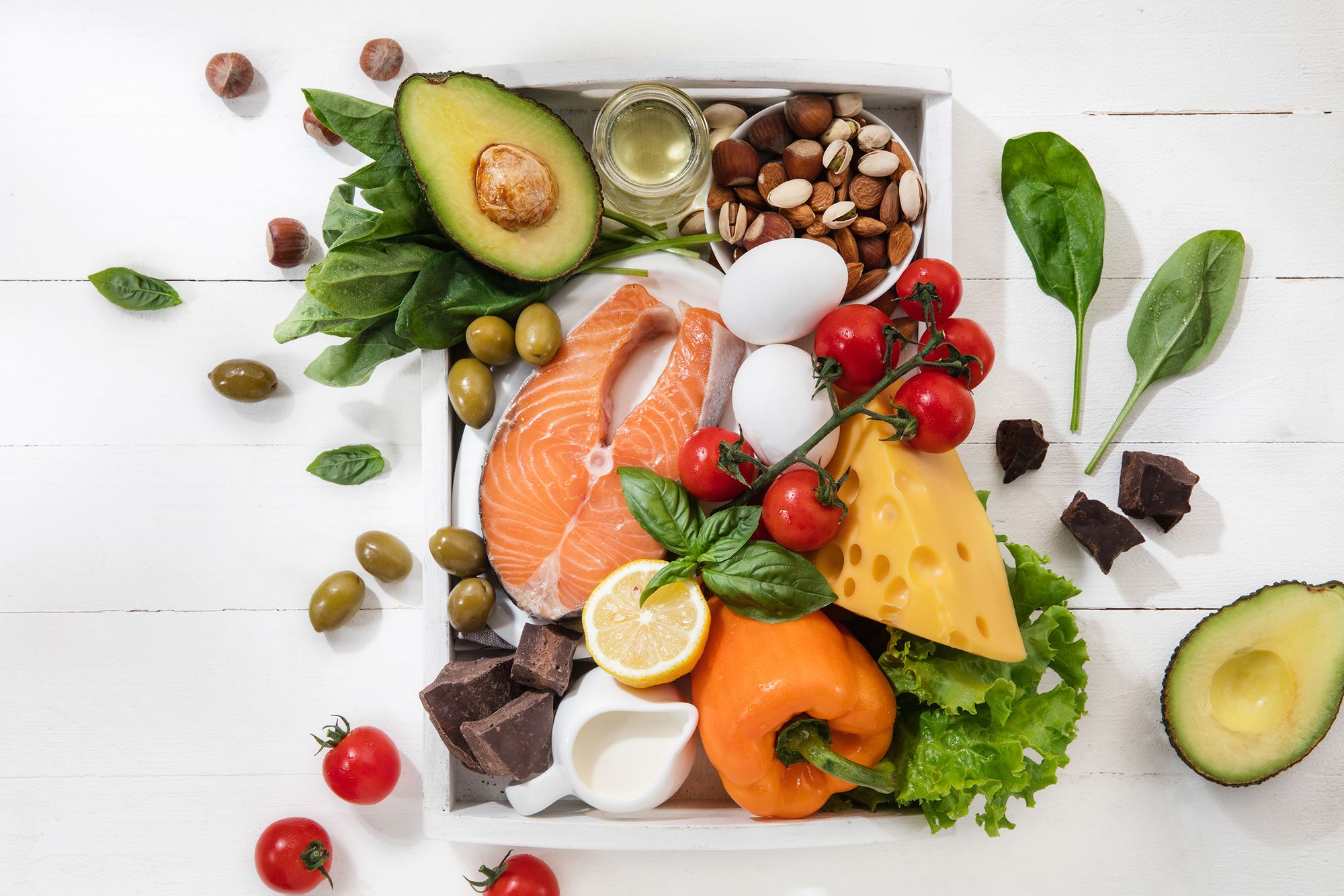Vegetables and fruits
- Prioritize vegetables over fruits
- Eat a wide variety of vegetables (especially cruciferous vegetables, eg. Broccoli, cauliflower, cabbage)
- Include green leafy vegetables often (ideally daily)
- Choose fruits that are lower in sugar
- Berries, kiwis, apples, pear, apricot
- Fruits that are particularly high in sugar are: pineapple, ripe bananas (it’s best to eat bananas when they are still a bit green), grapes, mangoes
- The daily recommended amount for vegetables varies between sources – the bare minimum should ideally be 2.5cups of vegetables per day, ideally much higher than this
- Eat fruit whole, avoid juicing as it strips away the fiber
- Limit dried fruit as the drying process concentrates sugar content
Protein
- Fresh or frozen meat, poultry and seafood
- Especially Fish rich in Omega 3 fatty acids (see below).
- Grass fed beef if that is available to you.
- Beans, lentils, chickpeas, tofu, tempeh and nuts are also good sources.
- Other examples of high protein sources: eggs, plain yogurt (try to avoid buying flavoured yogurt as it is usually loaded with sugar).
Fats
- Prioritize foods that are high in Omega 3 fats (salmon (ideally wild), sardines, anchovies, mackerel, herring, chia seeds, ground flaxseed, walnuts)
- Omega 3 fats are anti-inflammatory, Omega 6 fats are pro-inflammatory – ideal ratio 5:1
- Limit these oils: grapeseed, sufflower, sunflower, corn, soybean, rice bran, and canola oil (if you read the labels, you will notice that most packaged foods are made with these and if you eat out, you are inevitable consuming these). Avoid margarine.
- Oils to prioritize for cooking – Olive (especially extra virgin olive oil), avacado oil
- Nuts – walnuts, almonds, cashews, Brazil nuts
- Limit/avoid peanuts as they are allergenic
- When buying nuts, opt for raw nuts (soaking nuts makes them easier to digest). Avoid buying premade trail mixes as often they contain added sugars or added inflammatory oils.
Carbohydrates
- Avoid/limit “refined” carbohydrates. Refined means that the grain’s coating has been removed and the grain has been essentially pulverized into a fine powder. This process removes nutritional content and fibre. Your body ends up absorbing it into the bloodstream very quickly, which leads to rapid glucose spikes and many downstream health problems (fatty liver, diabetes, weight gain, heart disease, stokes, cancers). Examples include most pastas, breads, crackers, pretzels)
- Gluten can contribute to low grade inflammation and increase intestinal permeability so depending on your health goals, it may be best to limit or avoid gluten.
- Pastas can be an occasional dish but ideally not daily. Cooking pasta al dente or having a glass of apple cider vinegar mixed with water prior to heavier carbohydrate meal can help decrease glucose spikes.
- Better options – sweet potato, squash, beans, barley, quinoa, buckwheat.
Spices
- You can be very generous with adding garlic, onions, ginger, turmeric, black cumin, chilli peppers, cinnamon and other spices and herbs
- When cooking with garlic, wait about 10 mins after cutting/mincing it before putting it into your cooking to allow the main beneficial health ingredients to activate.
Special note about fermented foods
- Fermented foods are extremely powerful for supporting the “good” bacteria in our gastrointestinal tract. Try to include them regularly.
- Eg Sauerkraut, kimchi, pickled vegetables, pickled ginger, plain yogurt, plain kefir.
Beverages & Desserts
- Green tea or matcha has powerful antioxidants. If you are not a tea drinker, try adding matcha powder to your home made smoothie or baking.
- If you are a coffee drinker, try to limit coffee to 1 cup per day in the morning. Unsweetened. Choose organic coffee if that is available to you.
- Most milk substitutes (almond milk, soy milk, oat milk) have sugar added. Read the labels.
- If you choose to drink alcohol, limit < 2 drinks/day for men and < 1 drink/day for women, but in the ideal world, I would recommend limiting alcohol as much as possible or not drinking it at all.
- Try to limit desserts to special occasions during a shared experience or try your best to make your own so you have more control over how much sugar is added (usually you can comfortably half or use 3/4 the sugar that the recipe calls for without significant difference in taste).
Limit/avoid
- Processed foods and fast food.
- Sodas, juices
- Deli/processed meats – ham, salami, pepperoni etc.
- Excess sugar – ideally aim for less than 25g of sugar per day (which is about 6 teaspoons). 1 can of Coca Cola contains 39g of sugar. You get the idea.
General Tips
- You have to listen to your body. What works for one person, does not work for another. Learn to listen to the cues that your body is sending you and adjust. There is no one set of guidelines that is going to work for everyone. Some people don’t respond well to cruciferous vegetables, dairy, gluten etc. The only thing there is good consensus about is not eating processed, junk food.
- Read the labels – not for the calories but to understand the quality of the food.
- Consistency compounds. This is not a diet, this is a way of living and taking care of your body so it can serve you in the long term. Experiment with what works for you.
- Prioritize cooking at home. Share meals with others. Learn simple new recipes.
- Quality of food we eat is much more important than strict guidelines/portioning or counting calories.
- What we put into our bodies day in and day out matters greatly.
Prioritize your health, before you have to prioritize your illness.
